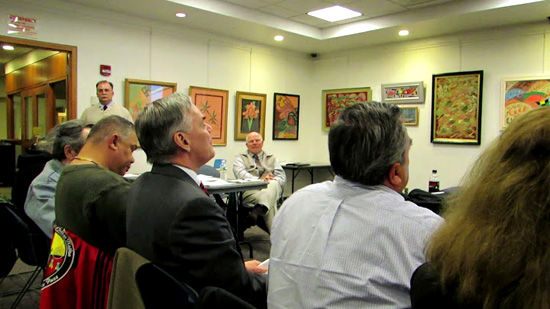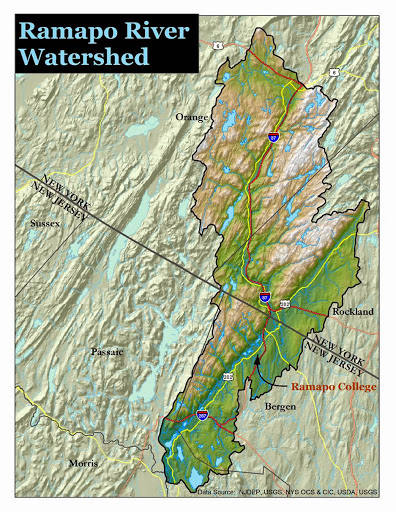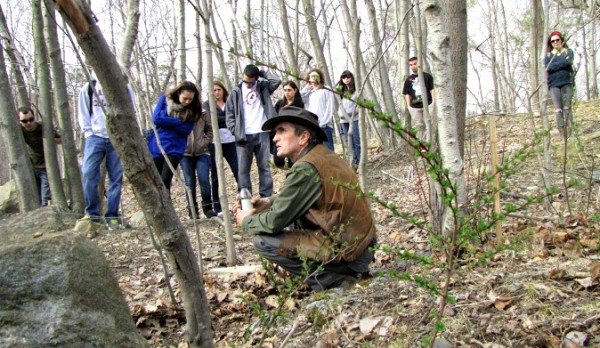
Ramapo Supervisor Christopher St. Lawrence at recent DEC public meeting at Suffern Library / Photo by Geoff Welch
It’s been another long season along the Ramapo River that has included remediation in Torne Valley of long buried Ford paint sludge, the installation of new SOS fuel tanks in Tuxedo and the ever-growing DeMarino dirt hill on Rt. 17. Some of these topics, and more, will be covered by environmental educators and professionals at Friday’s 19th Annual Ramapo River Watershed Conference at Ramapo College in Mahwah, NJ.
The NY Department of Environmental announced on April 14 that it was recommending additional Ford Motor Company paint sludge cleanup in the Town of Ramapo’s Torne Valley, with an estimated cost of some $7.5 million dollars.
The contaminated areas are approximately opposite the Ramapo Landfill, between the landfill and Torne Brook. The cleanup will continue recent remediation work in Torne Valley. Chuck Stead, Cornell Cooperative Extension Educator and Adjunct Professor at Ramapo College, will make a full presentation at the Watershed Conference on Paint Sludge Remediation in Torne Valley, as well as on the planned Planting of a Ramapough Indian Medicine Garden.
 Torne Brook and the Ramapo River are both important sources of public water.
Torne Brook and the Ramapo River are both important sources of public water.
According to Ramapo River Keep Geoff Welch, who organizes the Watershed Conference, the Ramapo River watershed is a federal Sole Source Aquifer area supplying all or part of the public water supply for over two million people in New York and New Jersey. With 21st-century escalating climate change stress, continuing developmental pressure, and framework of weak environmental regulatory systems on the municipal, state and federal levers, can the Ramapo River watershed be sustained?
Those are but a few of the questions the conference will tackle.
Ramapo River Watershed Conference 2014
The 19th annual Ramapo River Watershed Conference takes place Friday, April 18, at Ramapo College of New Jersey from 10 a.m. to 5 p.m. in the Trustees Pavilion.
Presented by the Ramapo River Committee and the Institute for Environmental Studies at Ramapo College, the conference will feature a variety of speakers on environmental topics pertaining to the Ramapo Valley region in New York and New Jersey.
The event is free but registration is requested at geoffwelch@gmail.com or (845) 712-5220.
This year’s conference will include presentations on:
Update on the Ford Motor Company Paint Sludge Remediation in Torne Valley, Environmental Justice Impacts of the Ringwood Superfund Remediation of Ford Paint Sludge, Land Use and Stream Management Strategies for Reducing Flood Risks and Protecting Water Quality, The Blue Acres Program in New Jersey, USGS Gaging Station Program in the Ramapo River Watershed.
There will be coffee and bagels at 9:30 am before the event starts.
In the Pavilion, Morning Session
10 a.m. – Opening Remarks: Ramapo College Professor Howard Horowitz and Geoff Welch, chairman of the Ramapo River Committee.
10:15 a.m. – Land Use and Stream Management Strategies for Reducing Flood Risks and Protecting Water Quality: Julie Moore, Water Resources Group Leader, Stone Environmental, Montpelier, Vermont
10:55 a.m. – The Blue Acres Program in New Jersey: Brandee Chapman, NJDEP
11:20 a.m. – The Darlington Schoolhouse Project: Ed Goodell, Executive Director, NY/NJ Trail Conference
11:50 a.m. – USGS Gaging Station Program in the Ramapo River Watershed: Chris L. Gazoorian – Hydrologist USGS NY Water Science Center, Troy, NY
12:20 p.m. – 1:30 pm LUNCH
In the Pavilion, Afternoon Session
1:30 p.m. – A Snake, a Skink, and Me: a New Alchemical Vision for the Ramapo Watershed: Kevin Dann, Independent Historian
2:00 p.m. – Update on the Ford Motor Company Paint Sludge Remediation in Torne Valley and Planting of a Ramapough Indian Medicine Garden: Walter “Chuck” Stead, Cornell Cooperative Extension Educator / Adjunct Professor, Ramapo College; Vincent Mann, Ramapough Sub Chief
2:30 p.m. – Environmental Justice Impacts of the Ringwood Superfund Remediation: RISE, The 2014 Environmental Assessment Course, Michael Edelstein, Professor
3 p.m. – The First Marked Nature Trail in the Country, Established on a Tributary of the Ramapo River in Tuxedo in 1925 by The Museum of Natural History: Sue Scher, Professor of Social Work Emeritus, Ramapo College
3:30 p.m. – Down and Dirty Suburban Environmental Action, Moving Forward in Creating Ecologically Sustainable Suburban Communities: Eric J. Fuchs-Stengel, Executive Director, MEVO (Mahwah Environmental Volunteers Organization, Inc.)
4 p.m. – The Ramapo River Near Hillburn, A Wordmap by Howard Horowitz, Ramapo College
4:20 – 5 p.m.- Reception



